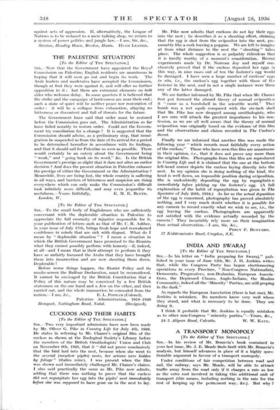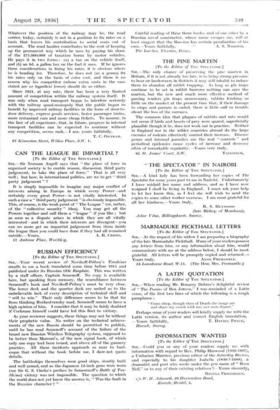A TRANSPORT MONOPOLY
[To the Editor of THE SPECTATOR.] SIR,—In his review of Mr. Bonavia's book contained in your last issue, Mr. J. E. Meade finds fault-with Mr. Bonavia's analysis, but himself advances in place of it a highly ques-
tionable argument in favour of a transport monopoly. -
Under conditions of fair competition between road and rail, the railway, says Mr. Meade, will be able to attract traffic away from the road only if it charges a rate as low as the extra cost involved in taking this- additional unit of transport (this means, including nothing in the rate for the cost of keeping up the permanent way,- &c.). But why ? Whatever the position of the railway may be;- the road carrier, today, certainly is not in a position to fix rates on a basis that leaves his contribution to social costs out of account. The road haulier contributes to the cost of keeping up the permanent way which he uses by paying his share of the Z71,000,000 of taxation borne by motor vehicles. He pays it in two forms : (a) a tax on the vehicle itself, and (b) an 8d. a gallon tax on the fuel it uses. If he ignores these considerations in fixing his rates, it is obvious where he is heading for. Therefore, he does not (as a genus) fix his rates only on the basis of extra cost, and there is no reason why his competitor (whose extra costs in the case stated are ex hypothesi lower) should do so either.
Since 1921, at any rate, there has been a very limited amount of competition within the railway system itself. It was only when road transport began to interfere seriously with the railway quasi-monopoly that the public began to benefit by improved railway facilities in the form of door-to- door delivery, express goods services, faster passenger trains, more restaurant cars and more cheap tickets. To assume, in the face of all experience, that, in future, progress in internal transport facilities can be expected to continue without any competition, seems rash.—I am, yours faithfully,







































 Previous page
Previous page